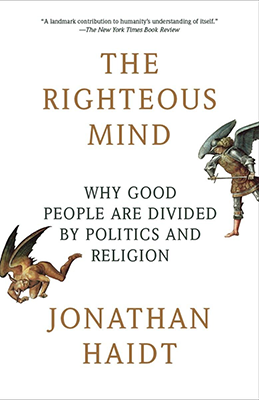The Righteous Mind
“The Righteous Mind: Why Good People Are Divided by Politics and Religion” is a thought-provoking book by social psychologist Jonathan Haidt. Here’s a summary:
Main Thesis:
Haidt argues that morality is not solely based on rationality but is deeply rooted in emotions and intuitions. He proposes that humans have evolved moral instincts that shape their judgments, and these instincts vary across cultures and individuals.
Key Concepts:
Moral Foundations Theory: Haidt introduces the idea of moral foundations, which are the psychological systems that underlie human moral intuition. He identifies six primary moral foundations:
– Care/harm
– Fairness/cheating
– Loyalty/betrayal
– Authority/subversion
– Sanctity/degradation
– Liberty/oppression
The Elephant and the Rider: Haidt uses the metaphor of an elephant and its rider to describe the relationship between our intuitive, emotional mind (the elephant) and our rational, conscious mind (the rider). He suggests that the elephant, our emotional intuitions, often leads, while the rider, our rational mind, serves more to justify the elephant’s direction rather than control it.
Morality and Politics: Haidt explores how these moral foundations manifest in political ideologies. He suggests that liberals primarily rely on the care/harm and fairness/cheating foundations, while conservatives tend to draw upon all six foundations more evenly. This divergence in moral values contributes to the political polarization seen in many societies.
The Hive Switch: Haidt discusses the concept of “hive psychology,” where individuals can transcend their self-interest and merge into a larger group, such as a community, nation, or religious organization. This hive mentality fosters cooperation and cohesion but can also lead to groupthink and hostility toward outsiders.
Implications:
– Understanding the diverse moral foundations can help bridge the gap between people with different political and religious beliefs.
– Recognizing the role of emotions in moral reasoning can lead to more effective communication and conflict resolution.
– Acknowledging the complexity of morality can foster greater tolerance and empathy toward individuals with differing viewpoints.
Overall, “The Righteous Mind” provides valuable insights into the nature of morality and how it influences human behavior, particularly in the realms of politics and religion. It encourages readers to approach moral and political discourse with humility and an open mind, recognizing the multifaceted nature of human morality.

